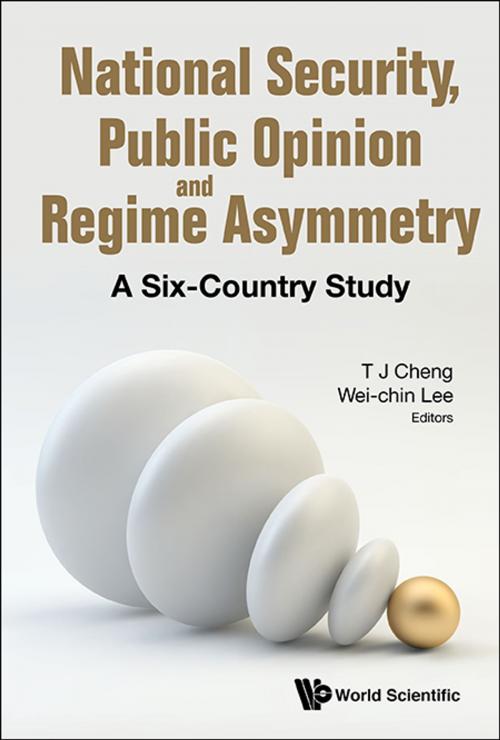National Security, Public Opinion and Regime Asymmetry
A Six-Country Study
Nonfiction, Social & Cultural Studies, Political Science, International, International Security| Author: | T J Cheng, Wei-chin Lee | ISBN: | 9789813206960 |
| Publisher: | World Scientific Publishing Company | Publication: | May 19, 2017 |
| Imprint: | WSPC | Language: | English |
| Author: | T J Cheng, Wei-chin Lee |
| ISBN: | 9789813206960 |
| Publisher: | World Scientific Publishing Company |
| Publication: | May 19, 2017 |
| Imprint: | WSPC |
| Language: | English |
New conventional wisdom posits that the public in democracies is inattentive but not really ignorant nor easily swayed, and indeed quite consistent and thoughtful when it comes to national security and foreign policy issues.
This volume builds on such a claim to study the attributes and impacts of public opinion on foreign and national security policy in six democracies: Taiwan, South Korea, Israel, Ukraine, Finland and West Germany. These countries face acute and sustained national security challenges posed by stronger authoritarian regimes close by, namely China, North Korea, the Arab nations, Russia and the Soviet Union. Given potential existential threats to their democracies, the public is typically tuned in, and in sorting out their policy stands, is mindful that the fundamental values of identity, sovereignty and prosperity may be jeopardized. Public opinion can indeed constrain statecraft here in these democracies ensnared in asymmetric dyads.
Many have studied public opinion and national security in democracies, but few have studied national security strategy of weak powers confronting great powers. This volume is the first attempt to examine this topic. The approach here is a comparative rather than country-specific study combining qualitative and quantitative research methods to enrich our understanding of the complexity and intrigues of the interplay between public opinion and national security under the condition of regime asymmetry. The wealth of data and careful examination of various issues from different theoretical approaches makes this volume an essential guide for courses and research in comparative foreign policy, international relations and democratic processes.
Contents:
- List of Contributors
- Acknowledgment
- Introduction: Public Opinion, National Security and Regime Asymmetry (T J Cheng and Wei-chin Lee)
- Taiwan Citizens' Views on Cross-Strait Relations: Pragmatic but Ambivalent (T Y Wang)
- Public Opinion, Regionalism and Foreign Policy Evaluation in South Korea (Jae H Ku)
- Israeli Public Opinion and Foreign Policy from 1977 to 2008 (Paul L Scham)
- Public Opinion and Ukrainian Foreign Policy (Paul D'Anieri and Taras Kuzio)
- The Role of Public Opinion in Finland's Foreign and Security Policy (Tuomas Forsberg and Matti Pesu)
- Cold War West Germany: Public Opinion and the Politics of Foreign Policy in a Penetrated System (Clay Clemens)
- Index
Readership: Academics, students and professionals interested in comparative foreign policy, international relations and democratic processes.
Key Features:
- This is the first volume that examines public opinion on foreign policy and national security in six contemporary democracies (pre-1989 Finland, Israel, South Korea, Taiwan, Ukraine, and West Germany) facing acute threats at their borders
- Its findings are refreshing and stimulating. Public opinion on foreign policy and national security in the six democracies embedded in asymmetric dyads tends to be very pronounced, core-value-anchored, sometimes homogenous (during crises or when strategic environment is clear), sometimes sharply divided (in time of peace-making or when geo-strategic and geo-economic parameters are in flux). In most of the six cases, public opinion has conditioning and enabling effects on foreign policy and national security
- Contributors are leading country specialists and comparativists well poised to analyze the interplay between the dynamics of domestic politics and the making of foreign and national security policies
New conventional wisdom posits that the public in democracies is inattentive but not really ignorant nor easily swayed, and indeed quite consistent and thoughtful when it comes to national security and foreign policy issues.
This volume builds on such a claim to study the attributes and impacts of public opinion on foreign and national security policy in six democracies: Taiwan, South Korea, Israel, Ukraine, Finland and West Germany. These countries face acute and sustained national security challenges posed by stronger authoritarian regimes close by, namely China, North Korea, the Arab nations, Russia and the Soviet Union. Given potential existential threats to their democracies, the public is typically tuned in, and in sorting out their policy stands, is mindful that the fundamental values of identity, sovereignty and prosperity may be jeopardized. Public opinion can indeed constrain statecraft here in these democracies ensnared in asymmetric dyads.
Many have studied public opinion and national security in democracies, but few have studied national security strategy of weak powers confronting great powers. This volume is the first attempt to examine this topic. The approach here is a comparative rather than country-specific study combining qualitative and quantitative research methods to enrich our understanding of the complexity and intrigues of the interplay between public opinion and national security under the condition of regime asymmetry. The wealth of data and careful examination of various issues from different theoretical approaches makes this volume an essential guide for courses and research in comparative foreign policy, international relations and democratic processes.
Contents:
- List of Contributors
- Acknowledgment
- Introduction: Public Opinion, National Security and Regime Asymmetry (T J Cheng and Wei-chin Lee)
- Taiwan Citizens' Views on Cross-Strait Relations: Pragmatic but Ambivalent (T Y Wang)
- Public Opinion, Regionalism and Foreign Policy Evaluation in South Korea (Jae H Ku)
- Israeli Public Opinion and Foreign Policy from 1977 to 2008 (Paul L Scham)
- Public Opinion and Ukrainian Foreign Policy (Paul D'Anieri and Taras Kuzio)
- The Role of Public Opinion in Finland's Foreign and Security Policy (Tuomas Forsberg and Matti Pesu)
- Cold War West Germany: Public Opinion and the Politics of Foreign Policy in a Penetrated System (Clay Clemens)
- Index
Readership: Academics, students and professionals interested in comparative foreign policy, international relations and democratic processes.
Key Features:
- This is the first volume that examines public opinion on foreign policy and national security in six contemporary democracies (pre-1989 Finland, Israel, South Korea, Taiwan, Ukraine, and West Germany) facing acute threats at their borders
- Its findings are refreshing and stimulating. Public opinion on foreign policy and national security in the six democracies embedded in asymmetric dyads tends to be very pronounced, core-value-anchored, sometimes homogenous (during crises or when strategic environment is clear), sometimes sharply divided (in time of peace-making or when geo-strategic and geo-economic parameters are in flux). In most of the six cases, public opinion has conditioning and enabling effects on foreign policy and national security
- Contributors are leading country specialists and comparativists well poised to analyze the interplay between the dynamics of domestic politics and the making of foreign and national security policies















